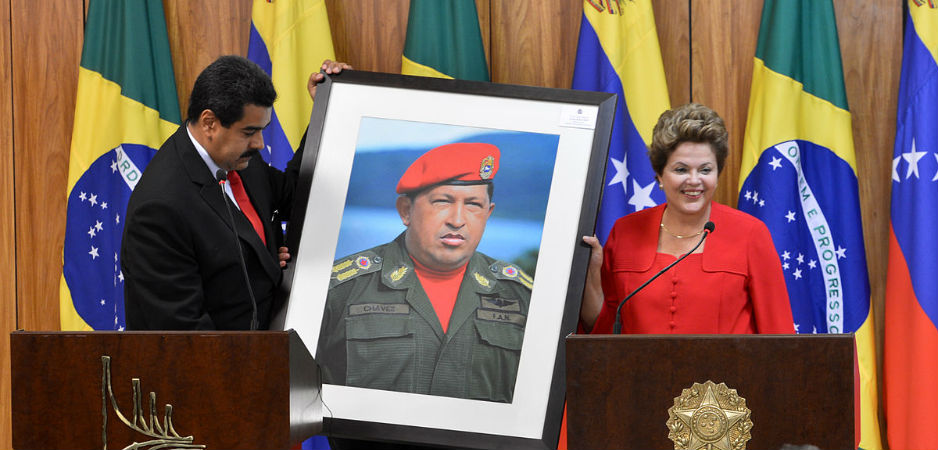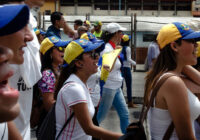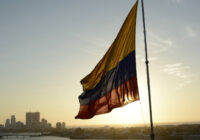Faced with electoral setback and rising popular discontent, the Venezuelan president just announced a number of economic reforms.
In Venezuela’s most recent parliamentary elections on December 6, 2015, Chavismo experienced its first political setback since coming to power 17 years ago. The Venezuelan opposition won 112 of the 169 seats in the National Assembly, the country’s legislative branch. According to several analyses, nearly 1.9 million self-identified supporters of the “Bolivarian Revolution” abstained, and the number of opposition voters increased by only 343,000 compared to the presidential election of 2013, when the winner was the current president, Nicolas Maduro.
The results of the parliamentary elections were described as a “punishment vote” due to a lack of effective action by the government to combat the economic and social crisis that has worsened since the second half of 2014, when the price of oil—Venezuela’s main and almost its only export—began to plummet. The crisis, according to President Maduro, is the product of an “economic war” orchestrated by private companies and sponsored by countries and international organizations seeking to oust him.
Venezuelan analysts say that the defeat of the ruling party, the Socialist Party of Venezuela (PSUV), was a consequence of this misguided notion of an economic war, the ruling party’s rejection of domestic criticism, including from former Chavista ministers, and a lack of leadership and mobilization on the part of Maduro as compared to late President Hugo Chávez.
This illustrates what the Bertelsmann Stiftung’s Transformation Index (BTI 2016), which compares governance and policymaking in 129 developing and transition countries, concludes about events of the past years: “What we have come to observe in Venezuela is the exceptional spectacle of a personalistic regime that has lost its personalistic leadership … In such a system, the authority of a leader like Chavez is indispensable to solve conflicts and to maintain stability.” Without it, the report says, the current situation of the South American nation seems unsustainable in the long-term.
President Maduro does not have a clear strategy to address the crises. Instead of assuming responsibility for the issue, he is blaming foreign enemies at every opportunity.
Conflict of powers
The December 6 results have led to a conflict of powers in Venezuela. After the installation of the National Assembly, the Supreme Court allowed a petition by the government to dismiss three opposition members recently elected to the National Assembly. This decision left the opposition without a qualified majority in parliament (112 deputies), which it needs to designate representatives of other government branches and convene a constituent assembly to draft a new constitution. Currently, two of the five judges on the Supreme Court are linked directly to the national government and the PSUV.
In addition, the government is reluctant to enact any laws promoted by the opposition, and in response, the opposition refuses to approve any requests from the president. In late January 2016, President Maduro issued an “economic emergency decree” that did not receive the necessary approval of parliament but was still declared to be in force by the Supreme Court. The Venezuelan Supreme Court has the power to interpret the constitution and declare whether decisions by the other branches of government are constitutional. As the BTI 2016 highlights, the lack of a separation of powers is a fundamental shortcoming of Venezuelan institutions.
National analysts believe that the conflict of powers in the country will deepen in the coming months if both parties do not reach agreements to solve the economic crisis, which may lead the country to social and humanitarian collapse.
Economic imbalances
Venezuela’s economy depends on oil revenue, and it imports 70% of all its consumer food. The current price of Venezuelan oil is around $20 a barrel, but the 2016 budget is based on a $40 benchmark. According to the Central Bank of Venezuela, the country ended 2015 with a general inflation rate of 180.9%, the highest in the world. The International Monetary Fund (IMF) estimates the rate of inflation to be 275%.
The decrease in foreign exchange income needed for the purchase of raw materials has affected food and medicine sectors, which are now experiencing shortages of up to 70%. In early February, the Venezuelan parliament declared a food emergency and humanitarian crisis, and asked the United Nations Food and Agriculture Organization (FAO) to send experts to the country to assess future risks.
The IMF estimates that inflation will spiral to 720% in Venezuela this year, and the economy is expected to contract for the third consecutive year. The situation has brought the possibility of a Venezuelan default into the debate. Yet experts like Mark Weisbrot, co-director of the Center for Economic and Policy Research, believe that President Maduro still has a year to reverse the direction of the national economy.
Weisbrot takes into account estimates by Bank of America Merrill Lynch (BOA), which put Venezuela’s assets at $60 billion, and he proposes four steps to stabilize the economy: create a system that protects those most vulnerable with food and medicine at affordable prices; unify the three official currency exchange rates, which are 25 times stronger than the unofficial one; remove price controls on gasoline—the cheapest in the world—and other goods; and diversify the economy.
Indeed, on February 17, President Maduro announced some free market reforms that point in the right direction. They include devaluing the Bolivar currency and raising the price of gasoline by as much as 6000%. The head of state also revealed changes to the tax system and expanded controls over food distribution.
However, Venezuelan analysts argue that these reforms are still insufficient and come too late. The new fuel prices, for instance, still do not cover production costs, and Venezuelan petrol will remain the cheapest in the world.
What happens if international oil prices go up?
The BOA dismisses economic recovery in the short-term and predicts that imports will continue to decline regardless of any adjustments of the oil price. It also argues that if exchange rate distortions are not corrected, food shortages and political consequences will increase.
The National Assembly speaker, Henry Ramos Allup, and other opposition leaders have announced plans to oust President Maduro within six months. “In the next few days we will have to present a concrete proposal for the departure of the national disgrace that is this government,” said Ramos Allup in early February.
It seems that Venezuela is in for more troubled times.
The views expressed in this article are the author’s own and do not necessarily reflect Fair Observer’s editorial policy.
Photo Credit: Agência Brasil / María Alejandra Mora
 We bring you perspectives from around the world. Help us to inform and educate. Your donation is tax-deductible. Join over 400 people to become a donor or you could choose to be a sponsor.
We bring you perspectives from around the world. Help us to inform and educate. Your donation is tax-deductible. Join over 400 people to become a donor or you could choose to be a sponsor.
Support Fair Observer
We rely on your support for our independence, diversity and quality.
For more than 10 years, Fair Observer has been free, fair and independent. No billionaire owns us, no advertisers control us. We are a reader-supported nonprofit. Unlike many other publications, we keep our content free for readers regardless of where they live or whether they can afford to pay. We have no paywalls and no ads.
In the post-truth era of fake news, echo chambers and filter bubbles, we publish a plurality of perspectives from around the world. Anyone can publish with us, but everyone goes through a rigorous editorial process. So, you get fact-checked, well-reasoned content instead of noise.
We publish 2,500+ voices from 90+ countries. We also conduct education and training programs
on subjects ranging from digital media and journalism to writing and critical thinking. This
doesn’t come cheap. Servers, editors, trainers and web developers cost
money.
Please consider supporting us on a regular basis as a recurring donor or a
sustaining member.
Will you support FO’s journalism?
We rely on your support for our independence, diversity and quality.







